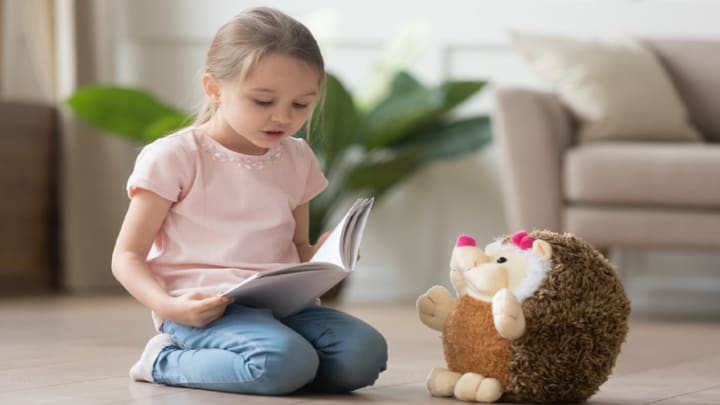Imaginary friends
is it okay for a youngster to have imaginary friends?

Many parents become concerned when their children begin to tell them about pals whom they cannot see. This appears to them to be odd and necessitates necessary action. Is that correct?
Karina Richtere, a practising psychologist, specialist on parent-child relationships, and mother of five weather children, explained why imaginary friends are necessary and how they benefit in the formation of a child's personality.Is it okay for a youngster to have imaginary friends?
Everyone requires a friend.

The youngster begins to form social relationships at the age of two. His circle of interests expands to include persons other than his immediate family. If the youngster is unable to satisfy his desire for intimate communication and a real buddy for whatever reason, he creates an imagined one.
Such a companion transforms into a wholly fictitious entity, such as a superhero, a fictitious youngster or adult, a magnificent animal, or even sorceresses and fairies. In addition, the youngster may "bring" toys to life, endowing them with the characteristics of an ideal play partner and someone who can be trusted with all of their secrets.
What tasks does an imaginary friend help to solve?

1. A creature that unconditionally understands the child and accepts him with all his flaws, helps the child to get the level of support he needs, to make the world more predictable and safe.
2. It helps to understand what the child really wants from friends - what qualities they should have, how to build relationships with him, and so on.
3. For humble children, an imaginary friend is one of the few ways to develop intimate relationships. Over time, they will be able to transfer them to the real world.
4. Also, an imaginary friend helps to get what the child lacks in real life - support, protection, acceptance.
5. And it also helps to diversify the child's usual life, makes it more intense and interesting, develops imagination and fantasy.

The appearance of such friends is an absolutely normal stage in the life of any child. He becomes a problem when the child cannot part with him and spends all his time on an imaginary friend, preferring the fictional world to games and communication with other children. This behavior can indicate severe trauma or unpleasant events that occur in the child's life. This is a reason to carefully ask your child about this or to sign him up for a consultation with a specialist if he refuses to trust you with his secrets.
It is also worth paying attention if you notice that the child is communicating with someone invisible, but he is hiding this friend from you. This suggests that there are trust and authority issues in your relationship with him. And the imaginary friend becomes a sort of substitute for the parents. In this case, it is also worth talking to the baby, but do not try to find out all his secret, but carefully find out what he lacks in your relationship. Perhaps you are so busy at work or household chores that you simply do not have time for normal communication with your son or daughter.
How do you react to an imaginary friend?

Let's start with what you should never do. If you notice that the child is talking to someone imaginary, or he himself tells you about his invisible friend, in no case should you dismiss this situation or pretend that nothing is happening. This approach will destroy the trust that develops between you and the child, and will force him to go even deeper into the world of fantasy and fiction.
Also, you can not forbid the child to "be friends". The need to protect a friend will make the imaginary friend more real and real. And, of course, it will affect your relationship: if parents react negatively to such secrets, is it worth it to trust them at all and tell about something?
Therefore, it is worth maintaining neutrality in the relationship between you, the child and his imaginary friend. On the one hand, you should not forbid and tell your son or daughter that he is inventing everything. On the other hand, it is not necessary to encourage the child in his fantasy and allow an imaginary friend to influence the life of the family.
However, such a friend can help you build relationships with your child and develop his imagination. Through these relationships, you can find out what the child lacks in relationships with you or peers, help your son or daughter develop their fantasy by coming up with stories about this friend. You can even write them down so that you can reread them together as your child gets older.
Also, within the limits of what is permissible, try to support the child's play, but try to limit him in it. If he says he won't eat or go to bed because the imaginary friend doesn't want to, discuss it or suggest an alternative. Play along with the child, but tell the friend that his friend obeys the rules of your family, like everyone else. And if children are supposed to be in bed at 9 o'clock, then they should be there.
Also, try to improve your child's life in the real world. Go to playgrounds or developmental activities more often, invite friends with children to visit and try to diversify his daily life. If an imaginary friend suggests that your child lacks your attention and participation, find an opportunity to spend time with your son or daughter. In general, give your child a real alternative to what an imaginary friend gives him.
When the child is ready, arrange a real send-off for his friend. First, tell us that there is a magical land that all imaginary friends go to. In it, they live with the same friends that other children invented, exchange experiences and wait for some of the kids to need it again. If you take such a friend's time for a long time, then some other child may find himself without help in difficult times.

Say that he himself will be able to call a friend from this world at any time, and that he will definitely help him. And if suddenly for some reason he is busy, then you are always ready to take on this role. Then, throw a goodbye party for your imaginary friend. Let the child figure out what you should do on it, what treats to cook and how best to organize everything. Such a symbolic goodbye will make it easier to move on to a new stage in life.
However, there is one subtle point with imaginary friends. If the appearance of such a friend coincided with the fact that the child became withdrawn, moved away from the family, constantly hides something or behaves in an unnatural way (his mood often changes, he refuses to go where he used to go with pleasure), this may indicate the fact that the child is (has been) sexualized, physical or psychological abuse. Try to carefully find out if this is the case.
In all other cases, an imaginary friend is one of the normal stages of a child's development. It appears to cover some of the child's needs, and disappears after these needs are satisfied. You don't need to do anything about it on purpose. If the child does not have an imaginary friend, this is also not a reason for panic or a search for pathologies. This means that all his needs are met, and you, as a parent, behave correctly.






Comments
There are no comments for this story
Be the first to respond and start the conversation.